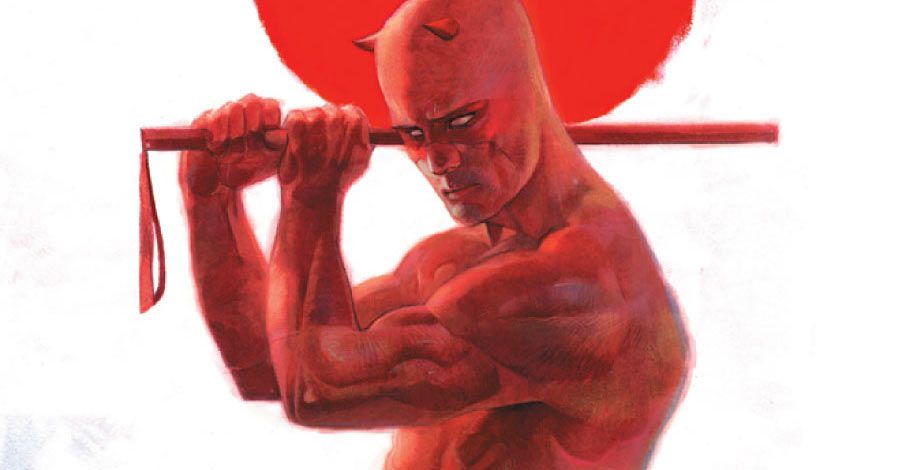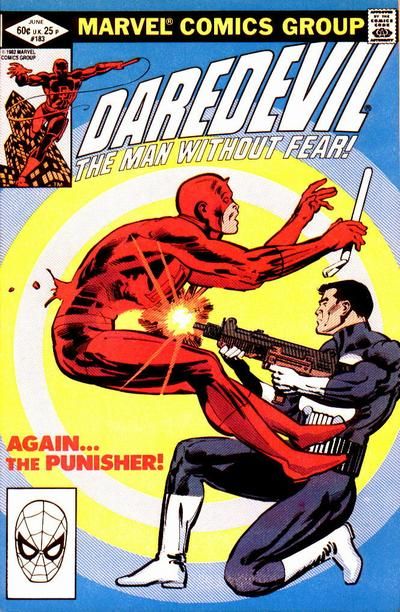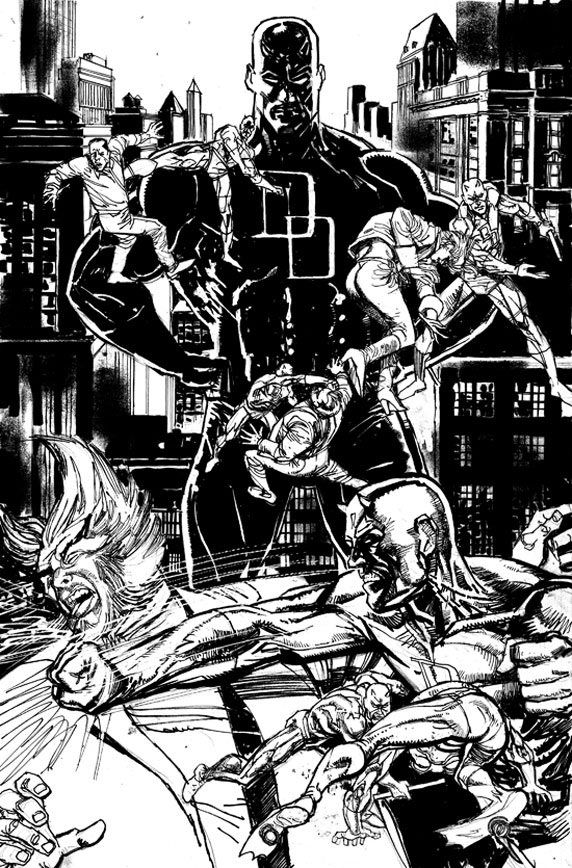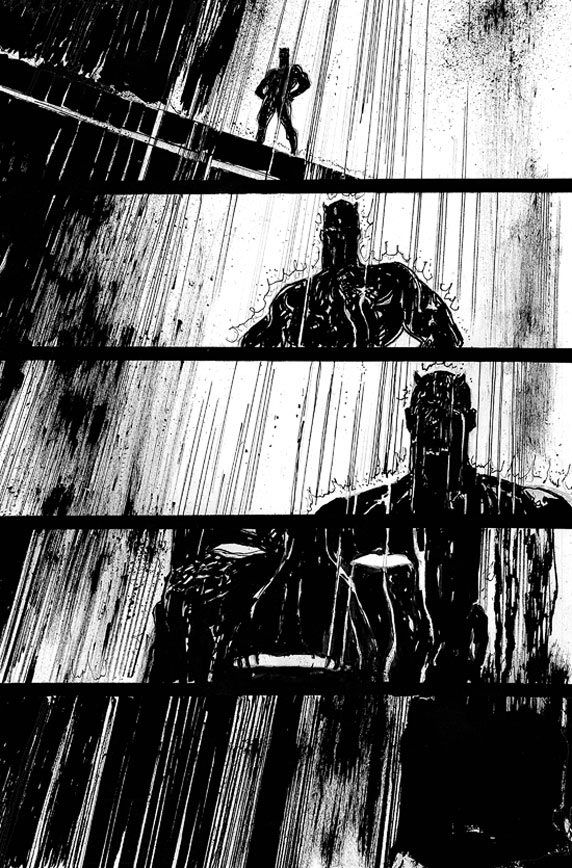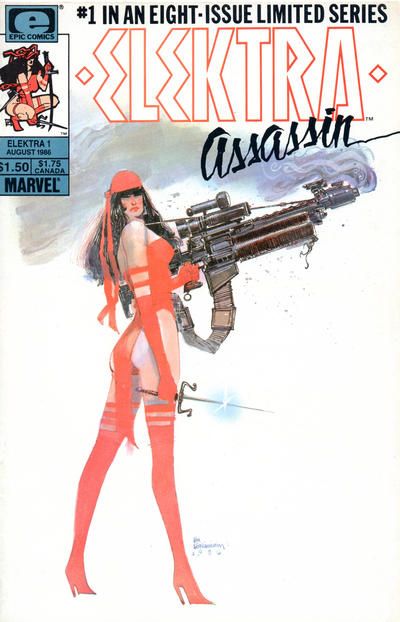Longtime Marvel Comics artists Klaus Janson, David Mack and Bill Sienkiewicz stepped up to the mic at a London Super Comic Convention panel this past weekend for a free-wheeling discussion on all things Daredevil. From Frank Miller's revitalizing run with Janson to the trio's unique collaboration on "Daredevil: End of Days," this proved to be one of the most interesting panels across the course of the convention -- and came with teasers for what might one day be a sequel to "End of Days."
Moderated by producer and comics fan Duncan McAlpine, the panel started by asking what the three panelists thought made Daredevil such a great character. Mack said that although Daredevil doesn't have powers or cosmic skills, he never gives up regardless of the adversity he faces. He's always pinned as being the underdog in his stories. Sienkiewicz agreed, saying he felt Daredevil was a very relatable character for him. The character doesn't need to be sent into outer space or surrounding by high tech -- he fits into a noir backdrop. Sienkiewicz likes those grittier aspects.
Janson praised the flexibility of the character, who can go from the noir styling to the lighter current Mark Waid/Chris Samnee run. Janson attributed this to the core humanity of the character, saying, "He's not like Batman -- Batman is crazy!" in reference to the common comparison made by fans.
When asked about their first experience reading "Daredevil," Mack said he started when he was a kid, reading the Miller/Janson era. He didn't know much about comics at the time, but he saw an issue with Punisher on the cover (likely "Daredevil" #183) and picked it up. He was shocked to find a comic about a blind lawyer wearing devil horns which addressed topics like drug use, and it took him right out his comfort zone. It wasn't until a few years later that he walked into a second hand store and, as a complete coincidence, found the next issue along in the run.
Sienkiewicz asked why he'd taken so long to find the next issue, and Mack replied that, at the time, he had no idea where comics came from. He didn't know there were specialist stores selling them. This led Sienkiewicz to muse that this must've been "destiny calling." Mack praised especially the lighting in the Miller/Janson run on "Daredevil," and the use of panel composition and design in those issues. He said that reading this run was what made him want to approach comics in the way he does today.
Sienkiewicz praised the work of Gene Colan on "Daredevil," which put the character "totally in my wheelhouse." He said he gravitated toward the fortitude and perseverance present in that iteration of the character, which spoke to him far more than the grander superheroes like Thor. Sienkiewicz said he felt this was a mode of comics he wanted to adhere to and a character he could admire.
Janson said that he entered straight with issue #1 of the series. When he was young his mother made him throw out his entire comics collection at the time, and "Daredevil" #1 just happened to be one of the issues he used to start rebuilding his collection. He told the audience he still has a complete run on "Daredevil" to this day.
McAlpine asked further on the topic of Gene Colan's influence, and Janson spoke to his artistry. He told the crowd that he thought Colan an amazing, underrated artist. He'd worked with Colan on comics like "Batman" and found him very tough to ink. He said that Tom Palmer, one of the greatest inkers in comics, was the best at interpreting Colan's work. "Gene always used the side of his pencil to draw, so it could look like smudges," Janson said. Only the best inkers could properly do justice to Colan's work.
Speaking of Janson's inking led McAlpine to ask about his experiences with Frank Miller and what the panel felt was so defining about their run together. Mack brought up the sense of mystery in the artwork. "Daredevil," which before had looked like a Marvel comic, now had a sense of noir with backlighting and suspense. The run took "Spider-Man" villain The Kingpin and built him into a different kind of character. Sienkiewicz said a lot of this effect was due to Janson's coloring on the series, which is often overlooked. Suddenly Daredevil was more grounded. "He was more comfortable in his own skin," said Mack -- a more street-level style character than before.
Janson said "there was no lightning strike for us." He'd been brought on before Miller, and his job was to keep the character looking consistent between artists. At that time artists like Gil Kane and Carmine Infantino were working on the series, and Janson thought Miller "would be just another penciller" he'd be working with in the same way. Instead, he found that Miller would pencil "incredibly tightly, and deep into the paper" as he was looking to impress Marvel with his work. It took time for him to loosen up his work, which eventually allowed Janson to come in and make a stronger contribution as inker himself.
"Then we broke up!" the artist said. Miller went on to do projects like "Ronin" and "Wolverine" with Chris Claremont. Janson said they'd done a three-year run with "Daredevil" in total, which was not an insubstantial amount of time to work on a character. "If I could speak for Frank," Janson told the crowd, "I think he'd said everything he wanted to say, at that time." However, the cartoonist would notably come back for future storylines in later years.
The discussion then turned to the recent "Daredevil: End of Days" series, which all three panelists had been involved with. Mack related the story of how he'd helped bring writer Brian Michael Bendis, now a Marvel fixture, to the publisher. Mack and artist Joe Quesada worked together on "Daredevil" just before Quesada was promoted to Editor-in-Chief, and Mack slipped copies of the independent crime comics Bendis wrote and drew to Quesada. Impressed with the writing (more than with the art), he invited pitches from the up-and-coming writer. As a pair, Mack and Bendis pitched a Nick Fury series with Sienkiewicz around 1999/2000 and almost had the project greenlit. Unfortunately, the comic fell apart during talks with veteran creator Jim Steranko, whom they wanted involved in some capacity.
Instead, Bendis and Mack worked on the Daredevil story "Wake Up," which ultimately led Bendis into his lengthy "Daredevil" run. Years later, one of Marvel's editors spoke to both Mack and Bendis separately about doing a new project, and the pair realized they didn't have time individually for it, but they could get the project underway if they worked together on it. They decided to make "Daredevil: End of Days" this big project, and wanted to get Sienkiewicz, Janson and Alex Maleev involved as well.
The discussions began around 2006, but the project got a little off-track. Sienkiewicz said he'd been staying with Steve Niles when he got details of the first issue sent across, but then he waited and waited for issue #2 to no avail. The project fell into limbo while Disney acquired Marvel, and then editor Warren Simons (now Editor-in-Chief for Valiant) left the publisher. It was only when Steve Wacker came in as editor that the series got back on track.
Mack told the crowd that while the original scripts were double-sized, the decision was made later to release the series with standard-length issues. Mack had to go through and divide up each script and give each new issue a proper start and end point. Despite any setbacks they faced, Sienkiewicz said there was always mutual respect amongst those involved in the project and a love for the character. Mack said he didn't mind if the project was delayed, because it meant he had more time getting to work alongside two of his heroes.
Sienkiewicz said he kept his schedule open especially so he'd have time for this project in particular. Janson spoke specifically on critical reaction at the time, stating that he felt news sites always seem to have a negative take on new comics projects getting delayed, but the fact was that Marvel gave him and the rest of the team years to finish the project and was always supportive. He said this was a very positive experience for him, as a creator, and cited it as the pencilling work he was most proud of.
With this, the floor was opened up to questions. The first asked if the panel had seen the new "Daredevil" Netflix series, and Mack and Sienkiewicz said they'd been on set during some of the Kingpin's scenes. They said that actor Vincent D'Onofrio was an absolutely amazing, scary Kingpin. Mack also said he brought copies of "Daredevil: End of Days" for the cast, but was surprised to find "Daredevil" star Charlie Cox already had it in his trailer.
They were next asked their thoughts on the current, lighter run of "Daredevil" by Waid & Samnee. Sienkiewicz said "everything has iterations" and mentioned The Beatles as an example. They went from Revolver to Sgt. Pepper's and were able to pull off both approaches. He did note that when he is done with a character -- such as after his "Moon Knight" run -- he considers himself done with that character, and in his preference he still thinks of Daredevil as a noir character, although he welcomes changes to that.
Mack felt that the current run was simply Daredevil internalizing everything that had happened to him, and that Waid's approach to the character reminded him of the time when, in-story, Daredevil created a fake brother in the form of Mike Murdock. Through that reference, the current "Daredevil" run still felt in-character for Mack. Janson said he'd read parts of the run, and particularly praised Chris Samnee as being "immensely talented." He said he missed the Catholicism of the character, which led him toward guilt and self-torture, but that actually "I'm happy to see him be happy for once!"
The next question asked if they had considered any future collaborations with the character. Mack said he'd love to work with both Janson and Sienkiewicz again, and said they had a tentative greenlight for a new series spinning out of "Daredevil: End of Days" -- this time starring The Punisher. He outlined that concept a little, but then got busy with other work. Janson said he was under contract with DC through the end of the year, but that he felt "End of Days" left plenty of material to do a sequel, and that he'd certainly love to do it. "As creators we want to do good work, that we are proud of, and so we'd all want to do this again."
Asked next about the Ben Affleck/Jennifer Garner "Daredevil" and "Elektra" movies, all three said they had not seen "Elektra." Sienkiewicz said he'd made a point not to watch it as he was very protective of the character and did not think she should be a WASP. He speculated on whether she might appear in the new series instead, and hoped it would be done in a stronger fashion. Mack said his favorite part of the "Daredevil" movie was actually watching interviews with comics creators in the DVD's special features section.
An audience member asked about Matt Murdock's love life, and how they felt his unluckiness in love affects him as a person. Would be altered if he ever truly found happiness? Mack praised the question and said it was something he'd thought about a great deal. He felt that in each relationship, Matt is able to connect in some aspects but not in others. He sees the world so differently that nobody can connect with him. This was why he'd created Echo, who also sees the world differently as she is hearing-impaired. Mack felt the character had mother-issues from childhood and that Matt had been radically affected by his father's influence, which pulled him into cycles of violence.
Mack felt that ever since he saved someone as a child and was blinded as a result, the character was doomed to repeat that same cycle every time -- he's always reliving that original accident, where he saves somebody but is then punished for it. The rest of the panel agreed with that analysis, leading to the last question where they were asked how the character ranks amongst Marvel's other iconic heroes. Janson places him right up alongside Spider-Man, and Sienkiewicz closed out the panel by saying:
"I think he's right up there. He's not a B-List character -- he's just a different kind of A-List character."

